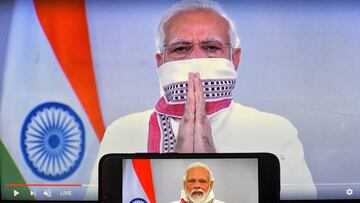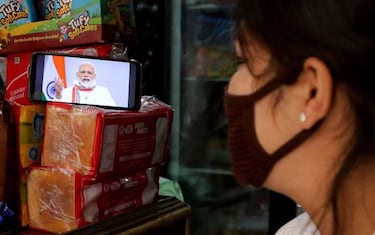Coronavirus lockdown in India: how long will it last and how long has it been extended?
Prime Minister Narendra Modi has extended the country's nationwide lockdown until May 3 in an effort to contain the continued spread of the Covid-19 virus.

India extended on Tuesday a nationwide lockdown for its 1.3 billion people until May 3 as its prime minister warned of economic sacrifices to save lives as the number of coronavirus cases crossed 10,000.
Sharp downward revisions to economic growth forecasts in the wake of the pandemic point toward sickening levels of unemployment, but Prime Minister Narendra Modi urged Indians to maintain the discipline shown in the first three weeks of the country's lockdown.
"That means until May 3, each and every one of us will have to remain in the lockdown," Modi said in a televised address to the nation.
Greetings to people across India on the various festivals being marked. May these festivals deepen the spirit of brotherhood in India. May they also bring joy and good health. May we get more strength to collectively fight the menace of COVID-19 in the times to come.
— Narendra Modi (@narendramodi) April 14, 2020
"From an economic only point of view, it undoubtedly looks costly right now; but measured against the lives of Indian citizens, there is no comparison itself."
India's neighbour, Pakistan, is also due to take a decision on its lockdown ending on Wednesday. Modi spoke as latest government data showed the number of people infected with coronavirus in India had reached 10,363, with 339 deaths.
Although the numbers are small compared with hard-hit Western nations, health experts fear that is because of India's low levels of testing, and actual infection levels could be far higher.
Lacking testing kits and protective gear for medical workers, India has only tested 137 per million of its population, compared with 15,935 per million in Italy, and 8,138 in the United States.

Health experts have warned that widespread contagion could be disastrous in a country where millions live in dense slums and the health care system is overstretched.
So far, more than three-quarters of India's cases are concentrated in about 80 of the country's more than 700 districts, including the two big cities, New Delhi and Mumbai.
Since Modi first imposed the lockdown in late March, the unemployment rate has almost doubled to around 14.5%, according data compiled by the Centre for Monitoring Indian Economy (CMIE), a Mumbai based private think-tank.
The shutdown sparked an exodus of millions of workers from small industries like textiles and leather, and service industries like retail, tourism, construction and other sectors in urban areas to their villages.
"I am well aware of the problems you have faced - some for food, some for movement from place to place, and others for staying away from homes and families," Modi said.
Agriculture, which employs about 45% of India's labour force, is still faring better though the sector has been hampered by disruptions to logistics.
Keep up to date with all the latest on the Covid-19 pandemic with our live blog
India lockdown
Related stories
At time of writing India had registered 10,541 confirmed coronavirus cases and 358 deaths in the country with 1,205 people having recovered after contracting Covid-19 (according to Johns Hopkins University data).
India's lockdown is one of the most complete in the world, with residents prohibited from leaving their homes, all non-essential businesses and schools closed and all roads and transport links, including railways and airports, travel shut down.